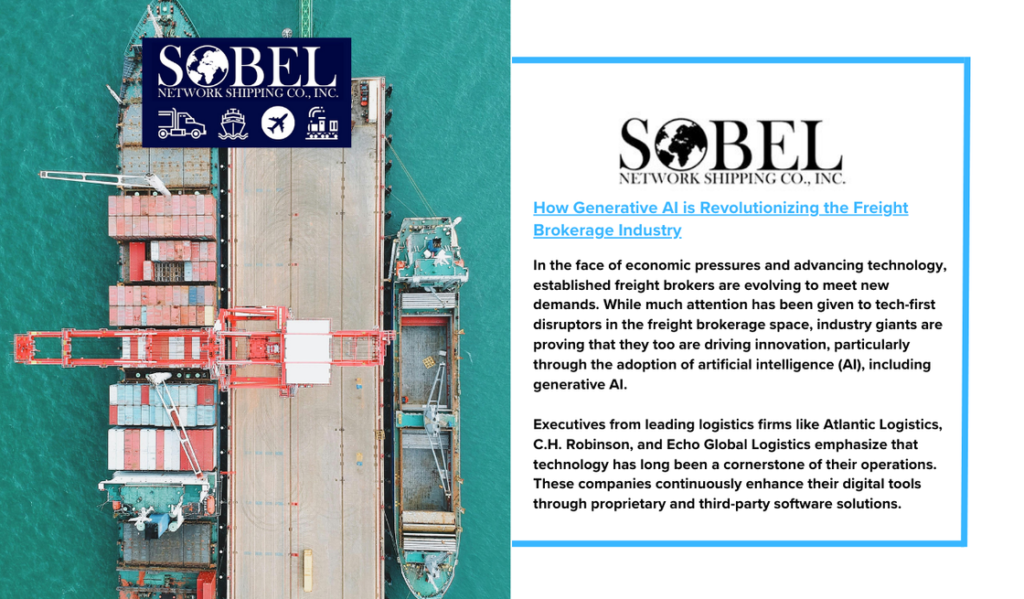In the face of economic pressures and advancing technology, established freight brokers are evolving to meet new demands. While much attention has been given to tech-first disruptors in the freight brokerage space, industry giants are proving that they too are driving innovation, particularly through the adoption of artificial intelligence (AI), including generative AI.
Executives from leading logistics firms like Atlantic Logistics, C.H. Robinson, and Echo Global Logistics emphasize that technology has long been a cornerstone of their operations. These companies continuously enhance their digital tools through proprietary and third-party software solutions. As a result, they remain competitive, demonstrating the industry’s ability to adapt and thrive amidst disruption.
Digitization Pioneers Lead the Way
Doug Waggoner, CEO of Echo Global Logistics, highlights that major players like J.B. Hunt and C.H. Robinson have been optimizing their operations through digitization for years. Waggoner points out that while proprietary systems have been the norm, smaller brokers are now benefiting from third-party digital tools that accelerate industry-wide automation.
However, Waggoner and others note that the longstanding technological expertise of established brokers often goes unnoticed amid the buzz around digital newcomers. With software engineers from top tech companies like Google, Amazon, and Microsoft, Waggoner jokingly refers to his company as “the original gangsters” of freight tech.
The Power of Generative AI in Freight Operations
Megan Orth, senior director of digital connectivity at C.H. Robinson, explains that generative AI is playing a crucial role in the freight industry’s ongoing digital transformation. AI systems are now capable of automating many processes, such as responding to thousands of daily email pricing requests. C.H. Robinson’s Navisphere platform, for instance, processes data from millions of shipments annually, and AI helps unlock insights from vast amounts of unstructured data like emails, documents, and images.
Orth emphasizes that successful digital tools in freight brokerage rely on vast datasets, which allow the technology to continually learn and improve. Generative AI, in particular, is transforming how companies manage the complexities of shipping by automating routine tasks and making smarter, data-driven decisions.
Navigating Industry Challenges with Technology
While technology is revolutionizing the freight brokerage industry, challenges remain. According to Nathan Lease, senior director at Gartner, early digital freight networks underestimated the complexity of the industry. Many of these digital startups soon realized that technology alone couldn’t overhaul the market; they needed to adapt to industry dynamics to stay relevant.
Economic factors, such as the current freight recession, have further complicated the landscape. As the spot market becomes more competitive, digital brokers must compete head-to-head with established firms. Some digital companies have even adopted traditional practices, such as leasing trailers for pre-loading, in response to market demands.
Despite these challenges, industry veterans like Rob Hooper, CEO of Atlantic Logistics, remain optimistic. Hooper sees digital tools as essential for the future of the freight industry, noting that customers increasingly want end-to-end service from a single provider. His company is already implementing AI-powered platforms like Qued to streamline processes and improve efficiency.
The Future of Freight Brokerage: Balancing Technology with Human Expertise
While digital transformation is accelerating, industry leaders agree that technology alone isn’t enough. Anne Reinke, president of the Transportation Intermediaries Association, points out that relationships and human expertise remain at the core of successful brokerage operations. While AI and other technologies can enhance efficiency, customers continue to rely on brokers for their in-depth industry knowledge and ability to navigate complex shipping networks.
As the freight brokerage industry evolves, companies must strike a balance between leveraging cutting-edge technology and maintaining the human touch that clients value. With advancements in AI, particularly generative AI, brokers are well-positioned to increase efficiency and streamline operations, even in a competitive and rapidly changing market.
In the coming years, the freight brokerage sector is expected to see even more significant advancements in digitalization. However, those who succeed will be the ones who understand the importance of combining technology with traditional business strategies, ensuring long-term growth and resilience in the face of disruption.


